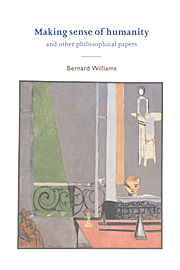Book contents
- Frontmatter
- Contents
- Preface
- I Action, freedom, responsibility
- II Philosophy, evolution, and the human sciences
- III Ethics
- 13 The point of view of the universe: Sidgwick and the ambitions of ethics
- 14 Ethics and the fabric of the world
- 15 What does intuitionism imply?
- 16 Professional morality and its dispositions
- 17 Who needs ethical knowledge?
- 18 Which slopes are slippery?
- 19 Resenting one's own existence
- 20 Must a concern for the environment be centred on human beings?
- 21 Moral luck: a postscript
- Index
13 - The point of view of the universe: Sidgwick and the ambitions of ethics
Published online by Cambridge University Press: 28 January 2010
- Frontmatter
- Contents
- Preface
- I Action, freedom, responsibility
- II Philosophy, evolution, and the human sciences
- III Ethics
- 13 The point of view of the universe: Sidgwick and the ambitions of ethics
- 14 Ethics and the fabric of the world
- 15 What does intuitionism imply?
- 16 Professional morality and its dispositions
- 17 Who needs ethical knowledge?
- 18 Which slopes are slippery?
- 19 Resenting one's own existence
- 20 Must a concern for the environment be centred on human beings?
- 21 Moral luck: a postscript
- Index
Summary
Sidgwick's book The Methods of Ethics was first published in 1874, and he took it, with substantial alterations, through five editions, and partly through a sixth. It has been recently described as ‘a systematic treatise on moral philosophy, examining in detail a far wider range of topics than any previous book on the subject, and setting new standards of precision in wording, clarity in exposition, and care in argument’. It is not merely an historical monument. After a period of fairly resolute neglect, it is now beginning once again to be admired and, it may even be, to some extent read. It bears a very real intellectual relation to modern Utilitarianism and to certain of its problems. There are difficulties not only about Utilitarianism, but about the very project of a systematic ethical theory, which emerge with special clarity from the pages of Sidgwick's book, particularly because Sidgwick was in various ways both more and less conscious of them than modern writers have been. It is the relevance of Sidgwick's book to a large and still very pressing question, the possibility of ethical theory, that I shall discuss.
Of course Sidgwick was not only famous for this book, or for his other work in philosophy. Born in 1838, he had an interest from his undergraduate days in enquiries into supernatural phenomena, and he played an important part in the early history of the Society for Psychical Research, founded to pursue on a supposedly scientific basis what Sidgwick sometimes called his ‘ghostological’ interests.
- Type
- Chapter
- Information
- Making Sense of HumanityAnd Other Philosophical Papers 1982–1993, pp. 153 - 171Publisher: Cambridge University PressPrint publication year: 1995
- 31
- Cited by



